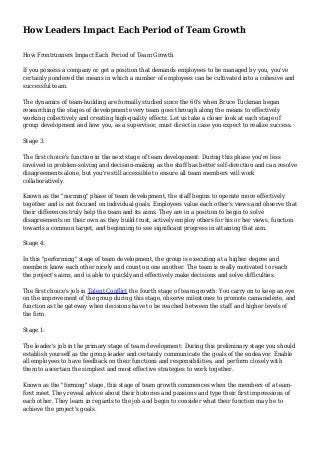
How Leaders Impact Each Period of Team Growth
- 1. How Leaders Impact Each Period of Team Growth How Frontrunners Impact Each Period of Team Growth If you possess a company or get a position that demands employees to be managed by you, you've certainly pondered the means in which a number of employees can be cultivated into a cohesive and successful team. The dynamics of team-building are formally studied since the 60's when Bruce Tuckman began researching the stages of development every team goes through along the means to effectively working collectively and creating high-quality effects. Let us take a closer look at each stage of group development and how you, as a supervisor, must direct in case you expect to realize success. Stage 3: The first choice's function in the next stage of team development: During this phase you're less involved in problem-solving and decision-making as the staff has better self-direction and can resolve disagreements alone, but you're still accessible to ensure all team members will work collaboratively. Known as the "norming" phase of team development, the staff begins to operate more effectively together and is not focused on individual goals. Employees value each other's views and observe that their differences truly help the team and its aims. They are in a position to begin to solve disagreements on their own as they build trust, actively employ others for his or her views, function towards a common target, and beginning to see significant progress in attaining that aim. Stage 4: In this "performing" stage of team development, the group is executing at a higher degree and members know each other nicely and count on one another. The team is really motivated to reach the project's aims, and is able to quickly and effectively make decisions and solve difficulties. The first choice's job in Talent Conflict the fourth stage of team growth: You carry on to keep an eye on the improvement of the group during this stage, observe milestones to promote camaraderie, and function as the gateway when decisions have to be reached between the staff and higher levels of the firm. Stage 1: The leader's job in the primary stage of team development: During this preliminary stage you should establish yourself as the group leader and certainly communicate the goals of the endeavor. Enable all employees to have feedback on their functions and responsibilities, and perform closely with them to ascertain the simplest and most effective strategies to work together. Known as the "forming" stage, this stage of team growth commences when the members of a teamfirst meet. They reveal advice about their histories and passions and type their first impressions of each other. They learn in regards to the job and begin to consider what their function may be to achieve the project's goals.
- 2. Phase 2: Here is the "storming" stage of team growth where associates compete for standing and recognition of the differing views regarding what needs to be done and how it must be done, which necessarily causes disagreement. The leader's part in the next stage of team growth: During this stage your guidance is important in demonstrating how the team can solve issues jointly, operate both independently and as a cohesive group, and how their activities change team unity. You should start transitioning some decisionmaking to the group to promote independence while also being closely involved to immediately resolve